(完整版)仁爱版英语八年级上册教材同步详细讲解
(最新)仁爱英语八年级上册三单元教材详解
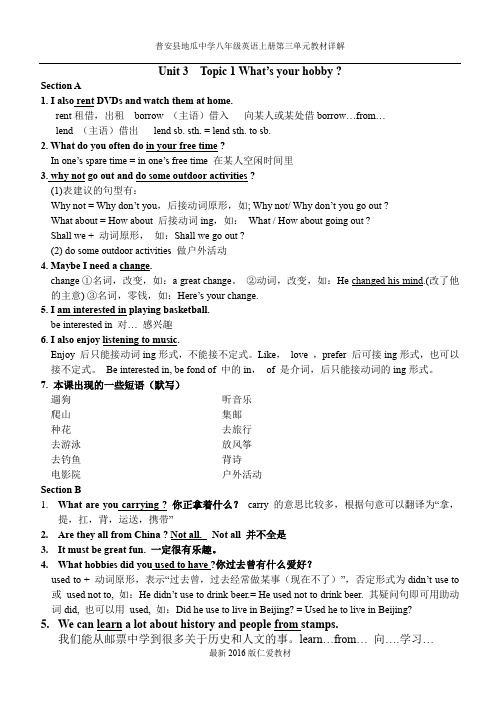
Unit 3Topic 1What’s your hobby ?Section A1.Ialso rent DVDs and watch them at home.rent租借,出租borrow (主语)借入向某人或某处借borrow…from…lend(主语)借出lend sb. sth. = lend sth. to sb.2. What do you often do in your freetime ?In one’s spare time = in one’s free time 在某人空闲时间里3.why not go out and do some outdoor activities ?(1)表建议的句型有:Why not = Why don’t you,后接动词原形,如; Why not/ Why don’t you go out ?What about = How about 后接动词ing,如:What / How about going out ?Shall we + 动词原形,如:Shall we go out ?(2) do some outdoor activities 做户外活动4. Maybe I need a change.change ①名词,改变,如:a great change。
②动词,改变,如:He changed his mind.(改了他的主意) ③名词,零钱,如:Here’s your change.5. I am interested in playing basketball.be interested in 对…感兴趣6. Ialso enjoy listening to music.Enjoy 后只能接动词ing形式,不能接不定式。
Like,love ,prefer 后可接ing形式,也可以接不定式。
Be interested in, be fond of 中的in,of 是介词,后只能接动词的ing形式。
仁爱版八年级上册英语教材分析
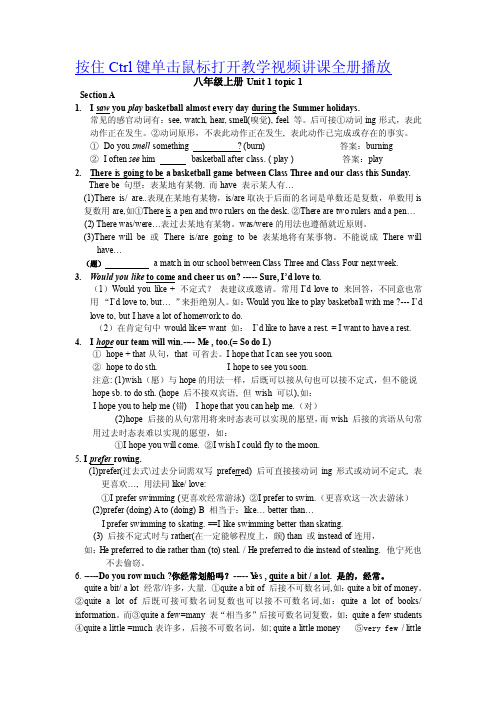
按住Ctrl键单击鼠标打开教学视频讲课全册播放八年级上册Unit 1 topic 1Section A1.I saw you play basketball almost every day during the Summer holidays.常见的感官动词有:see, watch, hear, smell(嗅觉), feel 等。
后可接①动词ing形式,表此动作正在发生。
②动词原形,不表此动作正在发生, 表此动作已完成或存在的事实。
①Do you smell something ? (burn) 答案:burning②I often see him basketball after class. ( play ) 答案:play2.There is going to be a basketball game between Class Three and our class this Sunday.There be 句型:表某地有某物. 而have 表示某人有…(1)There is/ are..表现在某地有某物,is/are取决于后面的名词是单数还是复数,单数用is 复数用are,如①There is a pen and two rulers on the desk.②There are two rulers and a pen…(2) There was/were…表过去某地有某物。
was/were的用法也遵循就近原则。
(3)There will be 或There is/are going to be 表某地将有某事物。
不能说成There willhave…(题) a match in our school between Class Three and Class Four next week.3.Would you like to come and cheer us on? ----- Sure, I’d love to.(1)Would you like + 不定式?表建议或邀请。
仁爱版八年级上册英语知识点归纳(K12教育文档)
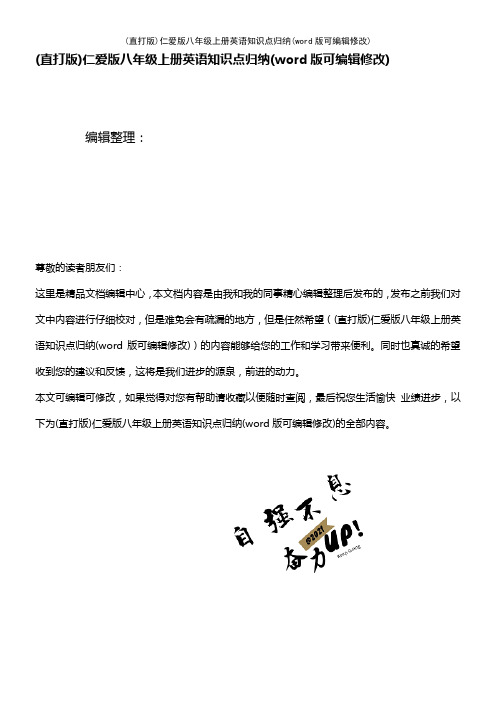
(直打版)仁爱版八年级上册英语知识点归纳(word版可编辑修改)编辑整理:尊敬的读者朋友们:这里是精品文档编辑中心,本文档内容是由我和我的同事精心编辑整理后发布的,发布之前我们对文中内容进行仔细校对,但是难免会有疏漏的地方,但是任然希望((直打版)仁爱版八年级上册英语知识点归纳(word版可编辑修改))的内容能够给您的工作和学习带来便利。
同时也真诚的希望收到您的建议和反馈,这将是我们进步的源泉,前进的动力。
本文可编辑可修改,如果觉得对您有帮助请收藏以便随时查阅,最后祝您生活愉快业绩进步,以下为(直打版)仁爱版八年级上册英语知识点归纳(word版可编辑修改)的全部内容。
八年级英语(仁爱版)上册语言点归纳Unit 1 Sports and GamesTopic 1 Are you going to play basketball ?一。
重点词语:1。
almost(反义词)never 2。
win(过去式)won(名词)winner 3。
ski(现在分词)skiing 4.famous(比较级)more famous5.arrive(同义词)reach6.leave(过去式))left7.popular(最高级)most popular 8.healthy(同义词)fit(名词)health(一)词组1。
during the summer holidays 在暑假期间2。
between…and…在两者之间3. cheer sb。
on 为某人加油4。
prefer doing sth. 更喜欢做某事5. quite a bit/a lot 很多6。
plan to do sth。
计划做某事7。
have a skating club 举办滑雪俱乐部8. go skating/skiing/bicycling/climbing/hiking 去滑雪/滑冰/骑车/爬山/远足9。
arrive in/at 到达10. play against…与……对抗/较量11。
(完整版)仁爱版八年级上册英语知识点总结

八年级上英语语法1) leave 的用法1.“leave+地址”表示“走开某地”。
比如:When did you leave Shanghai?你什么时候走开上海的?2.“leave for+地址”表示“起程去某地”。
比如:Next Friday, Alice is leaving for London.下周五,爱丽斯要去伦敦了。
3.“leave+地址 +for+ 地址”表示“走开某地去某地”。
比如:Why are you leaving Shanghai for Beijing?你为何要走开上海去北京?2)神态动词 should“应当”学会使用should 作为神态动词用,常常表表示外、诧异、不可以理解等,有“竟会”的意思,比如:How should I know? 我怎么知道?Why should you be so late today? 你今日为何来得这么晚?should 有时表示应当成或发生的事,比如:We should help each other我.们应当相互帮助。
我们在使用时要注意以下几点:1.用于表示“应当”或“不该当”的观点。
此常常指尊长教育或责怪晚辈。
比如:You should be here with clean hands.你应当把手洗洁净了再来。
2.用于提出建议开导他人。
比如:You should go to the doctor if you feel ill. 假如你感觉不舒畅,你最好去看医生。
3. 用于表示可能性。
should 的这一用法是考试中常常出现的考点之一。
例如:We should arrive by supper time. 我们在晚餐前就能到了。
She should be here any moment.她随时都可能来。
31. what 与 which 都是疑问代词,都能够指人或事物,但是 what 仅用来咨询职业。
如:What is your father?你父亲是干什么的?该句相当于:What does your father do?What is your father's job?Which 指代的是特定范围内的某一个人。
仁爱版八年级英语上册知识讲义-语法讲解(情态动词used to)
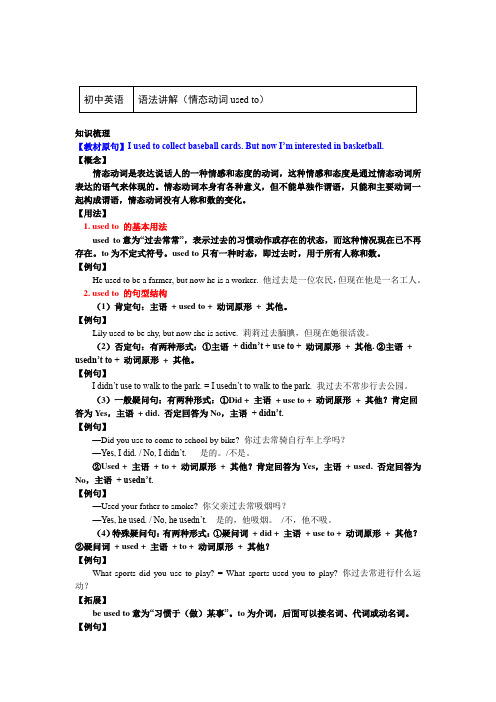
知识梳理【教材原句】I used to collect baseball cards. But now I’m interested in basketball.【概念】情态动词是表达说话人的一种情感和态度的动词,这种情感和态度是通过情态动词所表达的语气来体现的。
情态动词本身有各种意义,但不能单独作谓语,只能和主要动词一起构成谓语,情态动词没有人称和数的变化。
【用法】1. used to 的基本用法used to意为“过去常常”,表示过去的习惯动作或存在的状态,而这种情况现在已不再存在。
to为不定式符号。
used to只有一种时态,即过去时,用于所有人称和数。
【例句】He used to be a farmer, but now he is a worker. 他过去是一位农民,但现在他是一名工人。
2. used to 的句型结构(1)肯定句:主语+ used to + 动词原形+ 其他。
【例句】Lily used to be shy, but now she is active. 莉莉过去腼腆,但现在她很活泼。
(2)否定句:有两种形式:①主语+ didn’t + use to + 动词原形+ 其他. ②主语+ usedn’t to + 动词原形+ 其他。
【例句】I didn’t use to walk to the park. = I usedn’t to walk to the park. 我过去不常步行去公园。
(3)一般疑问句:有两种形式:①Did + 主语+ use to + 动词原形+ 其他?肯定回答为Yes,主语+ did. 否定回答为No,主语+ didn’t.【例句】—Did you use to come to school by bike? 你过去常骑自行车上学吗?—Yes, I did. / No, I didn’t. 是的。
/不是。
②Used + 主语+ to + 动词原形+ 其他?肯定回答为Yes,主语+ used. 否定回答为No,主语+ usedn’t.【例句】—Used your father to smoke? 你父亲过去常吸烟吗?—Yes, he used. / No, he usedn’t. 是的,他吸烟。
仁爱版八年级上册英语知识点汇总完整版完整版
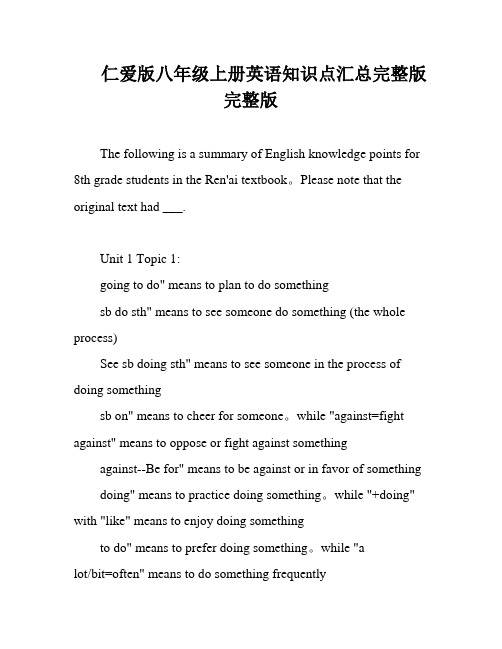
仁爱版八年级上册英语知识点汇总完整版完整版The following is a summary of English knowledge points for 8th grade students in the Ren'ai textbook。
Please note that the original text had ___.Unit 1 Topic 1:going to do" means to plan to do somethingsb do sth" means to see someone do something (the whole process)See sb doing sth" means to see someone in the process of doing somethingsb on" means to cheer for someone。
while "against=fight against" means to oppose or fight against somethingagainst--Be for" means to be against or in favor of something doing" means to practice doing something。
while "+doing" with "like" means to enjoy doing somethingto do" means to prefer doing something。
while "alot/bit=often" means to do something frequentlywhat kind of" means which one。
仁爱版八年级上册英语unit1知识点讲解

仁爱版八年级上册英语unit1知识点讲解Unit 1 Knowledge Points of Ren'ai Version Grade 8 EnglishUnit 1 of the Ren’ai Version Grade 8 English textbook covers a variety of important concepts in the English language. This article will provide a thorough explanation of these knowledge points to help students better understand the material covered in this unit.1. Verb tensesVerbs are an essential part of the English language, and understanding verb tenses is crucial in communicating effectively in English. The unit covers several tenses, including the simple present, present continuous, simple past, and past continuous.- Simple present: used to describe actions that are habitual or regular. Example: Tom reads books every day.- Present continuous: used to describe actions that are happening now or ongoing. Example: I am studying for my English test right now.- Simple past: used to describe actions that were completed in the past. Example: She bought a new phone two days ago.- Past continuous: used to describe actions that were happening in the past at a specific time. Example: We were having dinner at 7 pm last night.2. Preposition usagePrepositions are words that show the relationship between nouns and other words in a sentence. The unit focuses on several prepositions, including at, on, in, to, and with.- At: used to describe a specific time or location. Example: I will meet you at the park at noon.- On: used to describe a specific day or a surface. Example: The party is on Saturday. Put the book on the table.- In: used to describe a general location. Example: The cat is in the house.- To: used to describe a destination. Example: We are going to the beach.- With: used to describe being in someone's company or having something. Example: I am with my friends. She has a new car with leather seats.3. Passive voiceThe unit also covers the passive voice, which is used to describe an action where the subject is being acted upon. Example: The cake was made by John.4. Adjective typesAdjectives are words used to describe a noun or pronoun. The unit covers several types of adjectives, including possessive, demonstrative, interrogative, and articles.- Possessive: used to show ownership or possession. Example: This is my book.- Demonstrative: used to indicate the relative distance from the speaker or listener. Example: This car is mine. That car is his.- Interrogative: used to ask questions about a noun. Example: Whose book is this?- Articles: used to introduce a noun. Example: A dog ran by my house.5. Comparative and superlative forms of adjectivesThe comparative and superlative forms of adjectives are used to compare two or more things. The unit covers the rules for forming these forms of adjectives.- Comparative form: used to compare two things. Example: The cat is faster than the dog.- Superlative form: used to compare three or more things. Example: She is the strongest person in the gym.In conclusion, Unit 1 of the Ren’ai Version Grade 8 English textbook covers essential concepts in the English language, including verb tenses, prepositions, passive voice, adjective types, and comparative and superlative forms. By understanding these knowledge points, students can improve their English communication skills and succeed academically.。
最新仁爱版英语八年级上册教材解说 精华版

1、注重结构的 呈现与功能的运 用
2 、以单元为单位, 每个单元包括section A section B和selfcheck三部分,注重专 项训练。
仁 爱 版
人 教材编写特点 教 版
3、本教材的内容设置 使英语课程的五个总 体目标之间也实现了 相互融合、相互渗透 、相互促进。
3 、设计了大量的 听力素材,注重语 言技能的培养。
认真研读课标 准确把握教材
仁爱版 八年级上册
“三说”课件
一、说课标
二、说教材
三、说建议
总体目标
影响学生学习和 发展的重要因素 得体运用语言 的保证
文化知识 跨文化交际 意识与能力
提高学习效率, 发展自主学习能 力的保证
动机兴趣/自信意志 合作精神/祖国意识 国际视野 情感态度
语音/词汇/ 语法/功能/ 话题 语言知识
Reminding and warning Giving advice
Topic2 I must ask him to give up smoking .
Unit 2 Keeping Hed brush your teeth twice a day . illnesses Making appointments will will Topic2 I‘ll kick you the ball again Making requests and responses
Topic3 理解的 Unit 3 Topic1 Unit 2 基础上 培养 听懂对 Unit 4 学生 Unit 1 Review of Unit 1 话,通 用英 过不同 语做 学习单元 Review of Unit 2 的听力 事情 复习单元 活动, 的能 Review of Unit 3 力 帮助学 Review of Unit 4 生完成 课文及语法注释 词汇表 编写对新材 料的理 体例解,提 帮助学生养成良好的学习习惯,掌握 高其听 科学的学习方法,从而提高学习效率, 及目的 说能力。 成为真正的自主学习者。
(完整版)仁爱英语八年级上册unit1topic1课文

Unit 1 Playing sportsTopic 1 I’m going to play basketball?Section A①Michael: Hi, Kangkang.Kangkang: Hi, Michael. What are you going to do?Michael: I’m going to play basketball?Kangkang:you like playing basketball,righr? I often saw you play basketball during the summer holidays.Michael: Yes. You know, we are going to have a basketball game against Class Three on Sunday. Kangkang: I hope our team will win.Michael: Me too. Would you like to come and cheer us on?Kangkang: Sure.I'd love to.②A: Which sport do you prefer, cycling or rowing?B: I prefer rowing.A: Do you row much?B: Yes, quite a bit/a lot./No, seldom.A: Are you going to join the school rowing club?B: Yes, I am./No, I'm not. I'm going to...Section B①Michael: What’s your favorite sport, Maria?Maria: Basketball, of course.Michael: Me, too. And who's your favorite player?Maria: Lebron James. And yours?Michael: I like Yao Ming best.Maria: Do you know anything about him?Michael: Yes. He is 2.26 meters tall. He played for the Houston Rockets in the NBA.I’m going to be a basketball player like him. That's my dream. What are you going to be when you grow up?Maria: I'm going to be a scientist.②David Beckham, a famous soccer star, arrived in Beijing with his team yesterday.The teamwill play against China's national team.Their fans are very excited. It's too bad that they aren't going to stay in Beijing for long. They are leaving for Japan the day after tomorrow.③Dear Tony,Here are some photos of my favorite sports stars,Zhang Yining, Ronaldo and Liu Xiang. Zhang Yi ning,one of the world's best women table tennis players,won two gold medals for China in the 2004 Athens Olympics. Ronaldo comes from Brazil. He took part in the last World Cup. But Braz il didn't win first place. What a shame! Liu Xiang is an active young man from Shanghai,China. He is one of the best runners in the world.He broke the Olymic record and won a gold medal in the Athens Olymics.Do you have any photos of sports stars? Would you like to tell me somethin g about them? Please write back soon. Yours, MikeSection CAnn likes sports very much. She goes cycling twice a week and often goes mountain climbing on Sundays.She spends half an hour doing exercising in the gym every day.She learns baseball on Saturdays, and now she plays it very well.She is also good at jumping.There is going to be a school sports meet next weekend.She is going to take part in the high jump and the long jump. Her classmates are going to cheer her on.They are sure that she will win.Section D①GrammarFuture tense with be going toI’m going to play basketball.We are going to have a basketball game against Class Three on Sunday.She is going to take part in the high jump and the long jump.Are you going to join the school rowing club? Yes, I am./No, I'm not.What are you going to be when you grow up? I'm going to be a scientist.There is going to be a school sports meet next weekend.②FunctionI hope our team will win.Would you like to come and cheer us on? Sure, I’d love to.Which sport do you prefer, swimming or rowing? I prefer rowing.。
精品推荐:仁爱版八年级上册英语教材同步详解

八年级上册Unit 1 topic 1Section A1.I saw you play basketball almost every day during the Summer holidays.常见的感官动词有:see, watch, hear, smell, feel 等。
后可接①动词ing形式,表此动作正在发生。
②动词原形,不表此动作正在发生, 表此动作已完成或存在的事实。
①Do you smell something ? (burn) 答案:burning②I often see him basketball after class. ( play ) 答案:play2.There is going to be a basketball game between Class Three and our class this Sunday.There be 句型:表某地有某物. 而have 表示某人有…(1)There is/ are..表现在某地有某物,is/are取决于后面的名词是单数还是复数,单数用is 复数用are,如①There is a pen and two rulers on the desk.②There are two rulers and a pen…(2) There was/were…表过去某地有某物。
was/were的用法也遵循就近原则。
(3)There will be 或There is/are going to be 表某地将有某事物。
不能说成There willhave…(题) a match in our school between Class Three and Class Four next week.3.Would you like to come and cheer us on? ----- Sure, I’d love to.(1)Would you like + 不定式?表建议或邀请。
2017仁爱英语八年级上册教材同步详细讲解
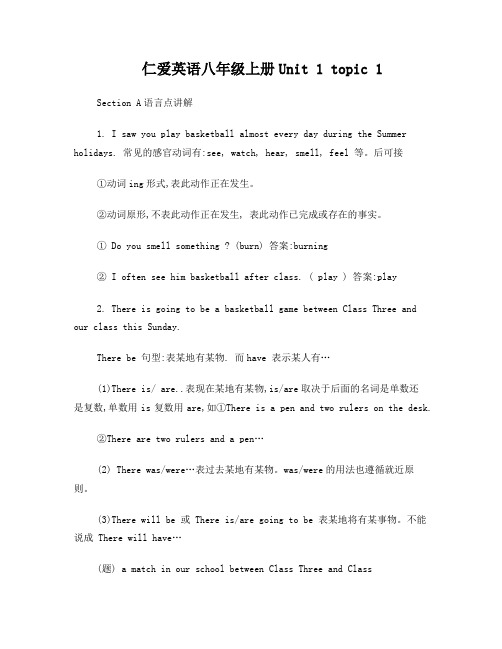
仁爱英语八年级上册Unit 1 topic 1Section A语言点讲解1. I saw you play basketball almost every day during the Summer holidays. 常见的感官动词有:see, watch, hear, smell, feel 等。
后可接①动词ing形式,表此动作正在发生。
②动词原形,不表此动作正在发生, 表此动作已完成或存在的事实。
① Do you smell something ? (burn) 答案:burning② I often see him basketball after class. ( play ) 答案:play2. There is going to be a basketball game between Class Three and our class this Sunday.There be 句型:表某地有某物. 而have 表示某人有…(1)There is/ are..表现在某地有某物,is/are取决于后面的名词是单数还是复数,单数用is复数用are,如①There is a pen and two rulers on the desk.②There are two rulers and a pen…(2) There was/were…表过去某地有某物。
was/were的用法也遵循就近原则。
(3)There will be 或 There is/are going to be 表某地将有某事物。
不能说成There will have…(题) a match in our school between Class Three and ClassFour next week.3. Would you like to come and cheer us on? ----- Sure, I’d love to.(1)Would you like + 不定式?表建议或邀请。
仁爱版八年级英语上册知识讲义-语法讲解(宾语补足语)-

知识梳理【教材原句】A special language makes computers talk with each other.【概念】英语中有些及物动词如make, call, find, get, set, ask, tell等带直接宾语后意义不完整,还需由名词、形容词、副词、不定式短语和分词短语等来补充其意义,说明宾语的行为状态、身份特征等。
这种成分叫宾语补足语。
【用法】宾语补足语是补充宾语的成分,通常置于宾语之后。
宾语和宾语补足语共同构成复合宾语。
可以作宾语补足语的有名词短语、形容词短语、介词短语、不定式短语和分词短语等。
1. 名词短语作宾语补足语。
【例句】He called it Mickey Mouse. 他把它叫做米老鼠。
We are making our school a beautiful garden. 我们正努力使校园变成一个美丽的花园。
2. 形容词作宾语补足语。
【例句】The Internet makes the world smaller. 互联网使世界变小了。
The news made her sad. 这消息使她感到悲伤。
3. 副词用作宾语补足语【例句】Put them away, please. 请把它们收起来。
Don’t leave with lights on. 离开时请关灯。
4. 介词短语用作宾语补足语【例句】He found the dog under the table. 他发现狗在桌子下面。
5. 动词不定式短语用作宾语补足语【例句】She wants you to call her back soon. 她想让你马上回电话。
I prefer him not to come. 我宁愿他不来。
6. 分词用作宾语补足语【例句】I can hear someone coming. 我听到有人来了。
I found all the windows broken. 我发现所有的窗户都破了。
仁爱版英语八年级[上册]教材同步详细讲解
![仁爱版英语八年级[上册]教材同步详细讲解](https://img.taocdn.com/s3/m/c528c41291c69ec3d5bbfd0a79563c1ec5dad7fd.png)
仁爱英语八年级上册Unit 1 topic 1 Section A 语言点讲解 1. I saw you play basketball almost every day during the Summer holidays. 常见的感官动词有:see, watch, hear, smell, feel 等。
后可接①动词ing 形式,表此动作正在发生。
②动词原形,不表此动作正在发生, 表此动作已完成或存在的事实。
① Do you smell something ? (burn) 答案:burning ② I often see him basketball after class. ( play ) 答案:play 2. There is going to be a basketball game between Class Three and our class this Sunday. There be 句型:表某地有某物. 而have 表示某人有…(1)There is/ are..表现在某地有某物,is/are 取决于后面的名词是单数还是复数,单数用is 复数用are,如①There is a pen and two rulers on the desk.②There are two rulers and a pen …(2) There was/were …表过去某地有某物。
was/were 的用法也遵循就近原则。
(3)There will be 或 There is/are going to be 表某地将有某事物。
不能说成 There will have …(题) a match in our school between Class Three and Class Four next week. 3. Would you like to come and cheer us on? ----- Sure, to come and cheer us on? ----- Sure, I’I’d love to. (1)Would you like + 不定式? 表建议或邀请。
仁爱版八年级上册英语知识点汇总完整版
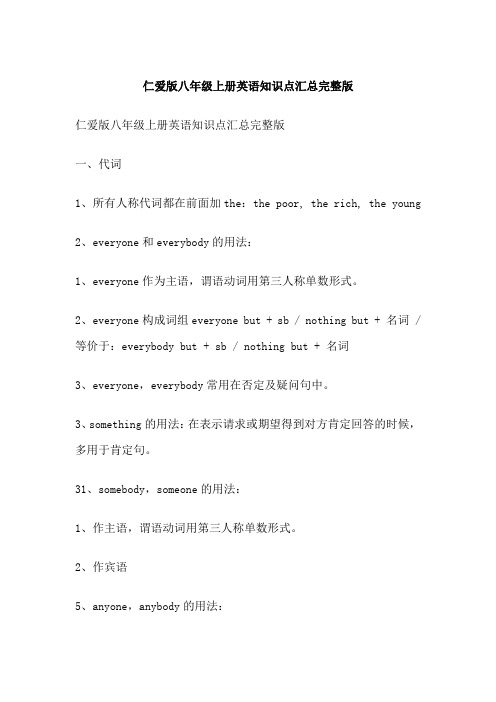
仁爱版八年级上册英语知识点汇总完整版仁爱版八年级上册英语知识点汇总完整版一、代词1、所有人称代词都在前面加the:the poor, the rich, the young2、everyone和everybody的用法:1、everyone作为主语,谓语动词用第三人称单数形式。
2、everyone构成词组everyone but + sb / nothing but + 名词 / 等价于:everybody but + sb / nothing but + 名词3、everyone,everybody常用在否定及疑问句中。
3、something的用法:在表示请求或期望得到对方肯定回答的时候,多用于肯定句。
31、somebody,someone的用法:1、作主语,谓语动词用第三人称单数形式。
2、作宾语5、anyone,anybody的用法:1、用作主语,谓语动词用第三人称单数形式2、用作宾语3、用在否定及疑问句中6、none的用法:1、none作主语,可指人,也可以指物。
谓语动词既可以用单数,也可以用复数形式。
2、none作宾语3、none用于否定及疑问句中7、every one的用法:every one = everyone 表示客观事实,即大家公认的事实置于所修饰词之后。
如: She cleaned every surface in the room, She cleaned every one of the windows.二、副词及其比较级1、very修饰形容词,副词原型 (not very difficult不难)2、quite修饰形容词,副词原型 (not quite good,不够好)3、too修饰形容词,副词原型 (The book is too difficult/ long for you to read这本书对你来说太难/太长而难以阅读)4、“很,非常”除了修饰形容词原级外,还可以修饰比较级和副词原形(如:very much,much)5、almost和nearly一样都表示“几乎”如:nearly ten o’clock / almost ten o’clock6、as…as之间用形容词或副词的原级,“和……一样”,不能用比较级。
仁爱版英语八年级上册Unit1__Topic2__重点句子讲解

Unit1 Topic2 重点句子讲解Section A【1】—Will you join us?你愿意参加我们吗?〔教材P9〕—I’d be glad to.我很乐意。
(1) will在这里表示意愿,劳烦别人做事或请求别人做事,还可用would表达委婉的语气。
(2) I’d be glad to 中的I’d 是I would 的缩写,to 后的动词可省略,但to不能省略。
be glad to ...乐意于……。
如:I’m glad to help you.我很乐意帮助你。
【2】Would you mind leaching me?你介意教我吗?〔教材P9〕(1) Would you mind ...? 表示“你介意……吗?〞1) 用法:是英语中委婉请求的表述方式之一,语气委婉、客气、礼貌,易于被对方承受。
此种表达也可用Do you mind…?但语气没有Would you mind…?委婉。
2) 构造:Would you mind doing sth. ? 做……好吗?否认式:Would you mind not doing sth. ? 别做……好吗?如:Would you mind closing the door? 你介意把门关上吗?Would you mind not wearing those old jeans? 别穿那些旧牛仔裤可以吗?3) 句中动名词前可加一个逻辑主语,一般用形容词性物主代词或名词所有格,用于不用意义不同。
如:Do you mind smoking? 你介意抽支烟吗?〔你抽烟〕Do you mind my smoking?你介意我抽支烟吗?(我抽烟〕4)后可接由if引导的从句。
如:Would you mind if I smoke here?如果我在这抽烟你介意吗?(2)Would you mind ...?用来提问,表达的语气较客气。
答复的方式有:1)听从对方提议,表示一点也不介意。
- 1、下载文档前请自行甄别文档内容的完整性,平台不提供额外的编辑、内容补充、找答案等附加服务。
- 2、"仅部分预览"的文档,不可在线预览部分如存在完整性等问题,可反馈申请退款(可完整预览的文档不适用该条件!)。
- 3、如文档侵犯您的权益,请联系客服反馈,我们会尽快为您处理(人工客服工作时间:9:00-18:30)。
(2)在肯定句中 would like= want 如: I’d like to have a rest. = I want to have a rest.
I hope our team will win.---- Me , too.(= So do I.)
hope + that从句,that 可省去。I hope that I can see you soon.
how构成的疑问词有:How tall(身高)多高; how high(山)多高;how heavy多重;how long 多长;How wide 多
how deep 多深;how old 多大…. 对应的回答常用“数词+量词+形容词”,如:1.70 meters tall; 2 kilometers
be sure to do sth..确信做某事We are sure to win next time.
be sure of/about (doing)sth. 表确信(做)某事 I’m sure of that.
How often does she go cycling ?
go +动词ing形式,表进行某种户外活动,如:go swimming, go fishing, go climbing.
玩弄一个篮球)
what are you going to be when you grow up ?= what do you want to be …?你长大想干什么?
David Beckham, a famous soccer star, arrived in Beijing with his team yesterday.
arrive at + (小地名);arrive in +(大地名)② get to ③ reach
The fans are very excited.
1)excited 表“感到激动的、兴奋的”,常只作表语,主语常为人。如:We are excited.
interested有趣的; tired感到疲劳的; bored感到厌烦的
joined in helping the old man. ③I’ll be in the relay race. (2) Join sb. in doing sth. 表加入某人的活动。 如:Will
How tall is he, do you know?----- Yes. He is 2.26 meters tall.
后接的从句常用将来时态表可以实现的愿望,而wish 后接的宾语从句常用过去时态表难以实现
I hope you will come. ②I wish I could fly to the moon.
. I prefer rowing.
(1)prefer(过去式过去分词需双写 preferred) 后可直接接动词ing形式或动词不定式, 表更喜欢…,用法同like/ love:
Would you like to come and cheer us on? ----- Sure, I’d love to.
1)Would you like + 不定式? 表建议或邀请。常用I’d love to 来回答,不同意也常用
I’d love to, but… ”来拒绝别人。如:Would you like to play basketball with me ?--- I’d love to, but I have a lot of
他宁死也不去偷窃。
----Do you row much ?你经常划船吗?----- Yes , quite a bit / a lot. 是的,经常。
quite a bit/ a lot 经常/许多,大量. ①quite a bit of 后接不可数名词,如:quite a bit of money。 ②quite a lot of 后既
two men teachers; sports meet
赢得一枚金牌; win a prize 赢得奖品; win the first place 赢得第一名
多么遗憾! 类似的有:What fun ! 多么有趣!
打破纪录;keep the record 保持纪录
Please write back soon. write back 回信
(2)exciting 表“令人激动兴奋的”既可作定语,也可作表语;作表语时,主语常为事物,如:①an interesting
类似的有:interesting令人有趣的; tiring令人感到疲劳的; boring令人感到厌烦的
对…有好处,Running is good for your health.
be bad at= do badly in 不擅长…. be bad for 对… 有害
be good/bad to sb. 对某人好/不好
They are sure that she will win.
be sure +(that)从句,表“确信…” 如:I’m sure (that) eating too much is bad for you.
I prefer swimming (更喜欢经常游泳) ②I prefer to swim.(更喜欢这一次去游泳)
相当于:like… better than…
I prefer swimming to skating. ==I like swimming better than skating.
, 表此动作已完成或存在的事实。
Do you smell something ? (burn) 答案:burning
I often see him basketball after class. ( play ) 答案:play
八年级英语同步详解
(3) 后接不定式时与rather than 或instead of连用,如:He preferred to die rather than (to) steal. / He preferred to die
She exercises every morning.
She plays it pretty well. pretty well= very well相当好
She is also good at jumping.
…= do well in…擅长… 如:I am good at English.= I do well in English.
she spends half an hour doing exercise in the gym every day.
exercise指“体操、练习”时,是可数名词,如:do morning exercises 做早操;do English exercises 做英语练
exercise指“锻炼,运动”时,是不可数名词。如:do exercise 做运动。exercise 还可作动词,指“锻
Zhang Yining, one of the world’s best women table tennis players, won two gold medals for China.
表… 中的一个,后接可数名词的复数,如:one of my friends
名词作定语修饰名词时,一般用单数形式,如:two book shops, two shoe shops, 但man,woman,sports修饰
; 3 kilos heavy; 20 years old
They both play for the Houston Rockets in the NBA.
为某个队效力;play against 与某个队比赛;play with 玩某物/与某人玩 (比较:play basketball 打篮球;
,如:quite a lot of books/ information。而③quite a few=many 表“相当多”后
如:quite a few students④quite a little =much表许多,后接不可数名词,如; quite a little money ⑤
/ little 很少很少。
八年级英语同步详解
在英语中有一些表示位置移动的词,如:go,come,leave, arrive, fly 可用现在进行时态表将来。如:They are flying
表将飞往武汉而不是正去武汉) They are leaving for Japan.= They will leave for Japan.
once a week, 一周一次twice a week一周两次, 三次或三次以上用“数字+times”如:
…..
go + v-ing形式的短语表“去做某事”如:go hiking 去徒步旅行,go shopping去购物, go skating 去滑冰,go
去滑雪;go fishing 去钓鱼。
There is going to be a basketball game between Class Three and our class this Sunday.
There be 句型:表某地有某物. 而have 表示某人有…
表现在某地有某物,is/are取决于后面的名词是单数还是复数,单数用is复数用are,如①There is a
Are you going to join the school rowing club?
join 加入(人群,组织) ②take part in 参加(活动,比赛)
(1)join可与in连用,后接活动,即 take part in=join in = be in后都接活动。如:①He joined in the game ;②
